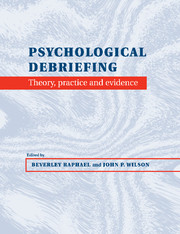Book contents
- Frontmatter
- Contents
- List of contributors
- Introduction and overview: Key issues in the conceptualization of debriefing
- Part I Key conceptual framework of debriefing
- 1 Stress management and debriefing: historical concepts and present patterns
- 2 Debriefing: its role in the spectrum of prevention and acute management of psychological trauma
- 3 Briefing and debriefing: group psychological interventions in acute stressor situations
- 4 Theoretical perspectives of traumatic stress and debriefings
- Part II Debriefing: models, research and practice
- Part III Adaptations of debriefing models
- Part IV Debriefing overview and future directions
- Conclusion: debriefing – science, belief and wisdom
- Index
1 - Stress management and debriefing: historical concepts and present patterns
from Part I - Key conceptual framework of debriefing
Published online by Cambridge University Press: 06 January 2010
- Frontmatter
- Contents
- List of contributors
- Introduction and overview: Key issues in the conceptualization of debriefing
- Part I Key conceptual framework of debriefing
- 1 Stress management and debriefing: historical concepts and present patterns
- 2 Debriefing: its role in the spectrum of prevention and acute management of psychological trauma
- 3 Briefing and debriefing: group psychological interventions in acute stressor situations
- 4 Theoretical perspectives of traumatic stress and debriefings
- Part II Debriefing: models, research and practice
- Part III Adaptations of debriefing models
- Part IV Debriefing overview and future directions
- Conclusion: debriefing – science, belief and wisdom
- Index
Summary
‘They had been brought to the last extremity of hope [yet they showed] a passionate conviction that it would be all right, though they had faith in nothing, but in themselves and in each other’. (Manning, 1990/1930, Introduction, p.xii)
EDITORIAL COMMENTS
Shalev challenges simplistic notions of debriefing as it is frequently applied and outlines its development in the historical contexts of understanding psychological trauma and post-trauma morbidity. He emphasizes the need to be responsive to the diversity of human responses in such situations, the significance of distress and arousal, and the psychological and neurochemical responses in the early post-trauma period. His conceptualization notes the need to consider the traumatogenic effects of extreme stress such as its undesirability, uncontrollability, unpredictability and inescapability. He suggests that prolonged distress during a critical post-trauma period may enhance or even create a ‘catastrophic memory’ through neuroendocrine mechanisms. The essence of preventing posttrauma morbidity is therefore to reduce distress and arousal.
Traditional approaches, which open up the expression of emotion, make interpretations of response, or describe symptomatic presentations, may be inappropriate. Furthermore, debriefing may be offered where the trauma or stress is continuing, or when other stressors such as loss and dislocation have also occurred. Because any intervention at this early stage may impact on a relatively small segment of the causative matrix, long-term evaluation may be inappropriate as a method of judging debriefing effectiveness.
Keywords
- Type
- Chapter
- Information
- Psychological DebriefingTheory, Practice and Evidence, pp. 17 - 31Publisher: Cambridge University PressPrint publication year: 2000
- 15
- Cited by

